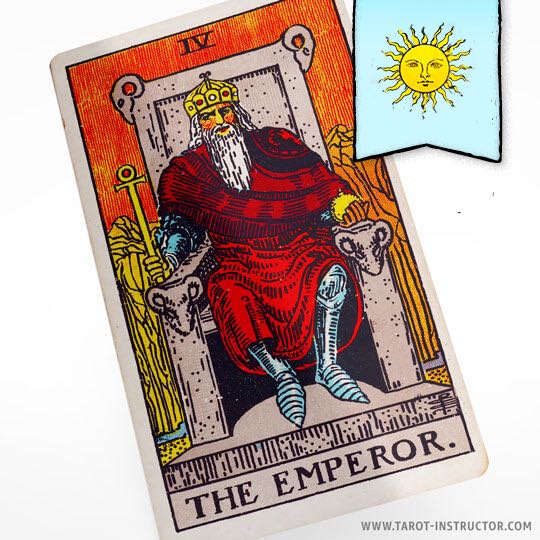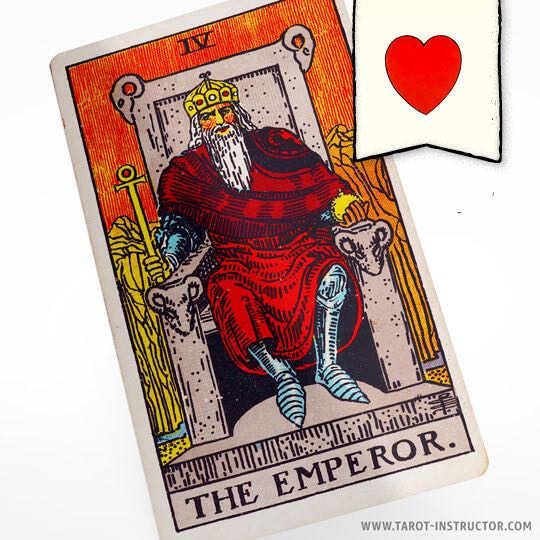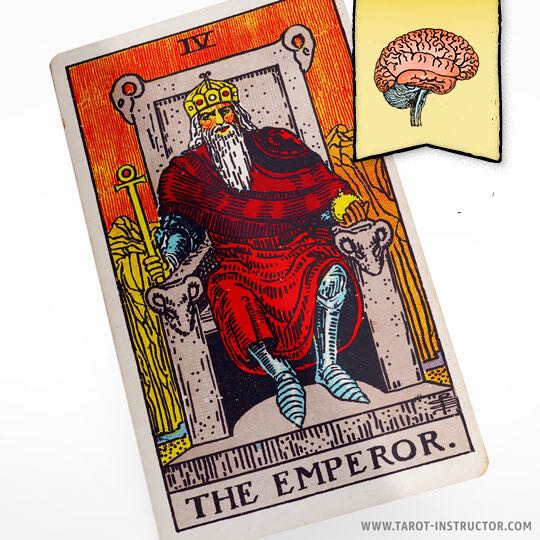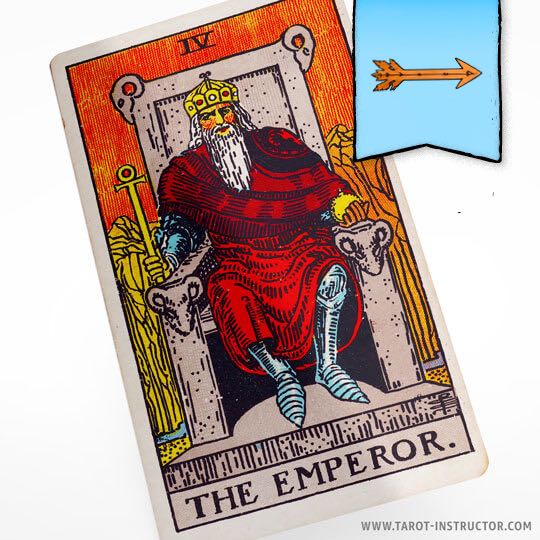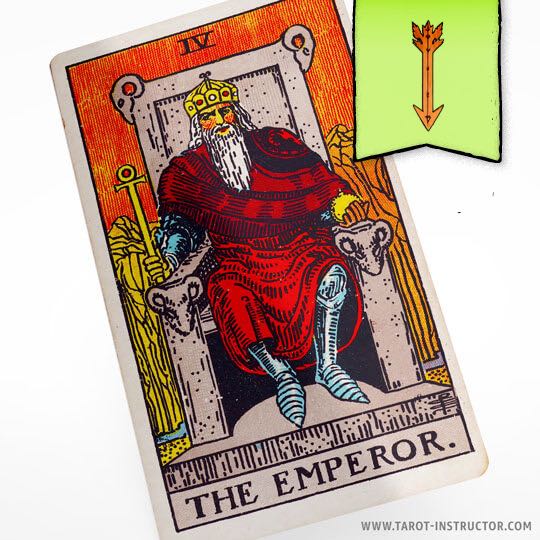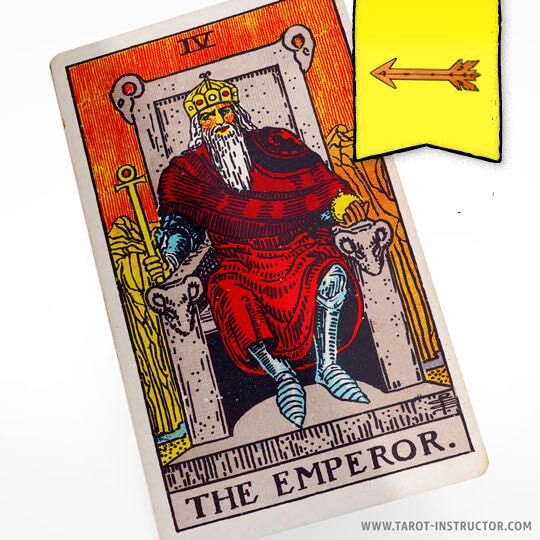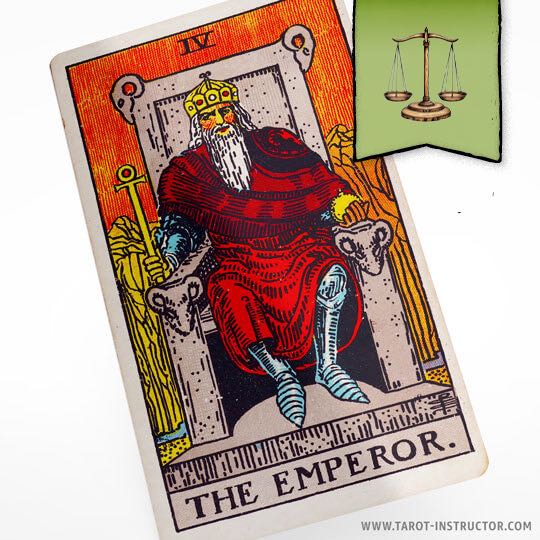The Emperor tarot card features following symbolic elements
The Emperor tarot card features following symbolic elements
Throne: The presence of a throne signifies the authority and stability that both partners provide to one another. Ram’s Heads: Representing courage and initiative, the ram’s heads highlight the importance of being proactive in romance. Crown: The crown adds a layer of power dynamic to the relationship, indicating that one partner may naturally assume a leadership role. Scepter: Like the crown, the scepter reinforces themes of control and guidance. It emphasizes the necessity for one partner to lead and manage aspects of the relationship, ensuring that both individuals work together towards common goals.
Red Robes: The vibrant red robes symbolize passion and energy, reflecting the intensity of the romantic connection. Mountain Backdrop: The mountain signifies strength and resilience, suggesting that the relationship is capable of overcoming obstacles. Stone Pattern: The stone pattern symbolizes stability and reliability, reinforcing the idea that the relationship is built on a solid foundation.
Table of content
The Emperor as advice
„Authority and structure bring stability.“
The Emperor keywords upright
Stability, Authority, Control, Order, Practicality.
The Emperor keywords reversed
Lack of Control, Chaos, Instability, Irresponsibility, Weak Leadership.
The Emperor card element
Fire
The Emperor zodiac sign
Aries
The Emperor as a Person: Understanding Its Depths
When exploring the concept of the Emperor as a person, we delve into the qualities of leadership, authority, stability, and structure. Just as the tarot card symbolizes these traits, understanding the Emperor as a person helps us see how these characteristics manifest in real life, influencing behaviors, decisions, and life paths. This article will explore the Emperor as a person, examining what it means when upright and reversed, and how these traits appear in men and women alike.
The Emperor as a Person: An Overview
The Emperor as a person embodies authority, discipline, and a commanding presence. They are often seen as natural leaders, individuals who take charge and establish order. When considering the Emperor as a person, think of someone dependable, confident, and driven by purpose. They value structure, ambition, and responsibility, often striving to create stability for themselves and others.
The Emperor as a Person Upright
When interpreting the Emperor as a person in the upright position, we see someone who exudes strength and confidence. This individual is often a leader—whether in their career, community, or personal life. They are assertive, disciplined, and capable of making tough decisions.
The upright Emperor as a person is someone who takes responsibility seriously. They are organized, strategic, and often serve as a pillar of support for those around them. Their sense of authority commands respect without arrogance, inspiring trust and admiration.
This person might be in a position of power or influence, such as a manager, mentor, or community leader. Their structured approach helps them achieve goals and provide stability in chaotic situations.
However, the Emperor as a person in this position should be mindful of rigidity. Too much emphasis on control can lead to inflexibility or authoritarian tendencies. Balancing strength with empathy is key to effective leadership.
The Emperor as a Person Reversed
In reverse, the Emperor as a person can suggest issues with control, domination, or insecurity. This individual might struggle with authority, feeling powerless or overly aggressive in their attempts to assert dominance.
The reversed Emperor as a person can also represent someone who is overly rigid or authoritarian, perhaps micromanaging others or being inflexible in their beliefs. They may have difficulty trusting others to take responsibility, leading to a lack of collaboration.
Additionally, this person might be experiencing a crisis of confidence, feeling overwhelmed by responsibilities or unable to assert their authority effectively. They could be battling issues of control, where their desire to dominate or suppress others causes unrest.
In this state, the Emperor as a person needs to reconnect with their inner strength and develop healthy boundaries. Learning to delegate, trust, and adapt can help them regain balance and confidence.
The Emperor as a Man
When considering the Emperor as a person in terms of gender, the archetype of the man often symbolizes leadership, authority, and stability.
The Emperor as a Man Upright
In the upright position, the Emperor as a man is a figure of strength and decisiveness. He is confident, disciplined, and often a protector or provider. This man values order and structure, working diligently to establish a secure environment for himself and his loved ones.
He might be a successful entrepreneur, a respected authority figure, or a family man who takes his responsibilities seriously. His leadership qualities inspire others to follow his example.
The Emperor as a man in this position often embodies the qualities of a traditional masculine figure—assertive, ambitious, and dependable. His presence provides a sense of safety and stability, making him a natural leader in both personal and professional settings.
However, he should be cautious of becoming overly domineering or rigid. Flexibility and understanding are essential for maintaining healthy relationships and adapting to change.
The Emperor as a Man Reversed
In reverse, the Emperor as a man might face issues with control or insecurity. He could be overly aggressive, authoritarian, or emotionally distant. Feelings of vulnerability or fear of losing control may manifest as harshness or stubbornness.
This man may struggle with authority, either abusing his power or feeling powerless beneath it. He might be prone to micromanaging or making impulsive decisions based on fear rather than logic.
During this phase, the Emperor as a man needs to reflect on his approach to leadership. Cultivating humility, trusting others, and embracing vulnerability can help him regain balance and genuine authority.
The Emperor as a Woman
Turning to the Emperor as a woman, this archetype often signifies strength, independence, and leadership qualities. She is a commanding presence who values structure and achievement.
The Emperor as a Woman Upright
When upright, the Emperor as a woman radiates confidence, authority, and resilience. She is strategic, organized, and capable of managing complex situations with ease. She often takes on leadership roles, inspiring others through her commitment and clarity.
This woman might be a CEO, a community organizer, or someone who confidently sets boundaries and pursues her ambitions. Her assertiveness encourages others to respect her authority and follow her lead.
Her independence and discipline make her a role model for empowerment and self-sufficiency. She balances her strength with compassion, understanding the importance of nurturing while leading.
The Emperor as a Woman Reversed
In reverse, the Emperor as a woman may face struggles with control, confidence, or authority. She might feel overwhelmed by responsibilities or struggle to assert herself. Self-doubt and insecurity could hinder her ability to lead effectively.
This phase may also reflect a tendency toward rigidity or stubbornness, resisting change or new ideas. She may be overly controlling or domineering in her relationships or work.
The Emperor as a woman in this state benefits from self-reflection and nurturing her inner strength. Building trust in her abilities and embracing flexibility can help her regain confidence and effective leadership.
Conclusion
The Emperor as a person, whether upright or reversed, offers profound insights into our relationship with authority, structure, and power. This card embodies the qualities of leadership, strength, and stability, but also warns of potential pitfalls like rigidity and domination.
When exploring the Emperor as a person, whether as a man or woman, we see that true leadership involves balancing authority with compassion and flexibility. The upright Emperor as a person inspires confidence, promotes order, and encourages growth.
Conversely, the Emperor as a person in the reversed position reminds us that overcontrol or insecurity can undermine our effectiveness. Recognizing these tendencies allows us to develop healthier, more balanced approaches to leadership and responsibility.
Ultimately, the Emperor as a person teaches us that strength is rooted in self-awareness and integrity. Embracing these qualities enables us to build a solid foundation for success, respect, and personal fulfillment.
Remember, the Emperor as a person symbolizes that true power lies in responsible leadership, confidence, and the ability to create order amidst chaos. By understanding this archetype deeply, we can harness its lessons to foster growth, stability, and resilience in our lives.
Source: Wikipedia The Emperor tarot card
Reddit Thoughts about The Emperor card
Quora The Emperor card meaning
Unlock the mysteries of tarot cards.
